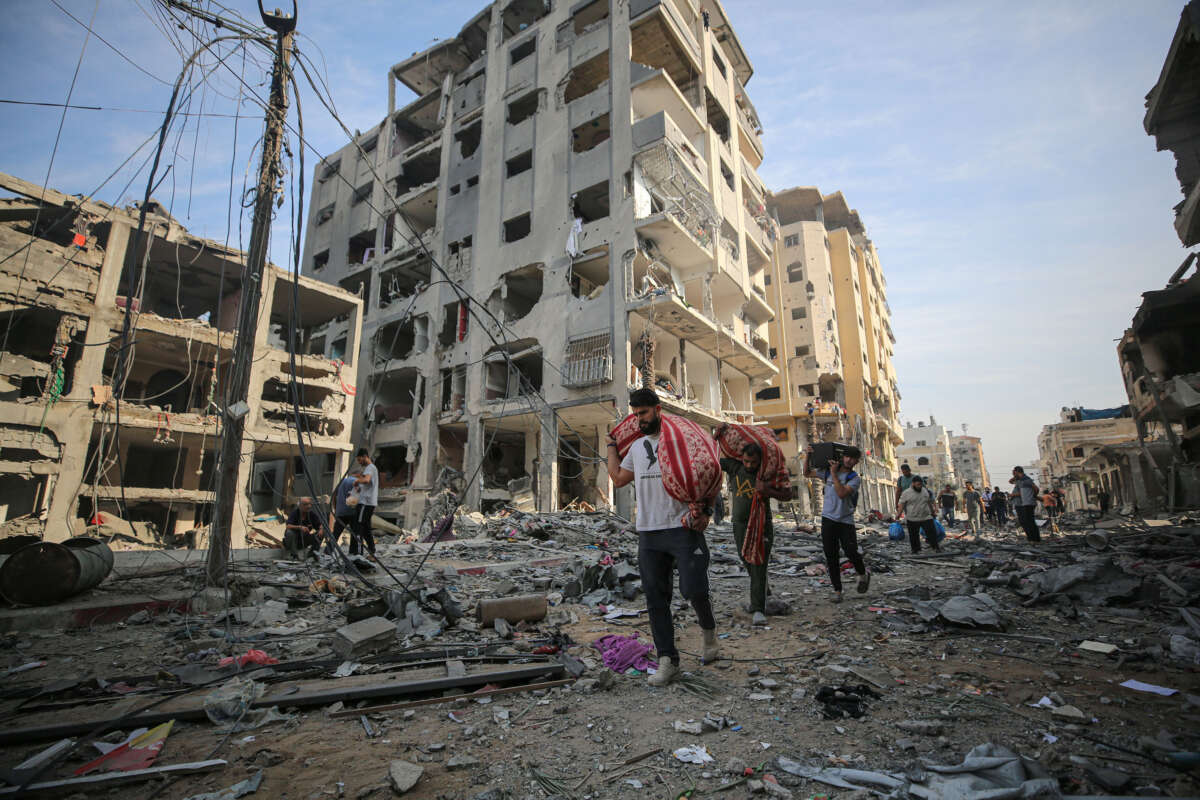Support justice-driven, accurate and transparent news — make a quick donation to Truthout today!
Late Thursday night, Israel’s military ordered 1.1 million Palestinians in Gaza to flee the northern half of the territory within 24 hours — an evacuation order that one U.N. spokesman said would be “impossible” to execute without “devastating human consequences.”
The order comes as many fear that a ground invasion of Gaza by Israeli forces is imminent.
Since Hamas’s killing of around 1,300 Israelis last weekend, Israel has launched a relentless and indiscriminate bombing campaign against Palestinian territories, leveling entire residential neighborhoods, wiping families off the population registry and killing more than 1,800 Palestinians, a figure that is likely to climb in the coming days. A third of the death toll are children.
Western media has largely focused on Hamas, framing the Israeli military attacks on civilians as justified — but many journalists are pushing back on that narrative, noting that Palestinians have faced decades of dispossession, settler violence and apartheid under Israeli occupation.
“This was not a provocation by Hamas, the provocation is that the Israeli regime has for decades placed Palestinians under colonial occupation,” said Yara Hawari, a senior analyst for Al-Shabaka, in a Sky News interview.
“The level of dehumanization is so phenomenal, you can’t even see us as humans,” Hawari added.
Israel’s attacks over the past week have destroyed key infrastructure in the region, including hospitals. The Israeli government has also cut off Gaza’s food and water, as well as other basic necessities, and health centers are running out of medical supplies to care for the wounded.
On Friday, Israel ordered Palestinians in northern Gaza to evacuate to Egypt or the southern portion of the territory. The area is highly populated — over 2 million Palestinians reside in Gaza overall, making the region one of the most densely populated areas of the world, with around 5,700 people per square mile. In the northern part of Gaza, that rate is closer to 9,000 people per square kilometer. Nearly half of Gaza’s population is under the age of 18.
The United Nations is urging Israel to reverse course, with U.N. spokesperson Stéphane Dujarric saying that the order will turn “what is already a tragedy into a calamitous situation.”
The World Health Organization has also condemned the order, noting that it would be “impossible” to follow, particularly for the thousands of Palestinians who have been injured and are being treated at health care facilities. Those awaiting treatment would be subjected to a “death sentence” under Israel’s demand for displacement, a spokesperson for the organization said.
Thousands have already begun fleeing northern Gaza for the southern part of the region.
“I’m seeing people holding their bags like they want to run away but where should we go? It’s a small city there’s no escape, we’re trying to save our lives,” Gaza City resident Farah Abo Sedo said. “They bomb us every single night without any mercy, there’s nothing left.”
“No-one protects us or sends us help, there’s no safe place here, there are a lot of children and pregnant women and no-one helps us,” Abo Sedo added.
Human rights advocates have warned that the order (and the subsequent military campaign that is likely to follow) will escalate the ongoing genocide of Palestinians in Gaza. Palestinian president Mahmoud Abbas has issued warnings of a possible “second Nakba,” referring to the catastrophic mass displacement and killing of Palestinians in 1948 during the Arab-Israeli war, violence that has continued long afterward.
“So many roads have been destroyed & most don’t have vehicles. They know that this is impossible,” Palestinian journalist Yara Hawari said on social media. “This is ethnic cleansing & the world knows it.”
Moving more than a million people out of northern Gaza is “obviously impossible,” noted Palestinian American writer and analyst Yousef Munayyer. “Israel is preparing for mass atrocities.”
A video has recently gone viral of a teenager in Gaza begging for international solidarity with the Palestinian people, showcasing the devastating human toll of the occupation.
“We’re not pieces of trash. We’re humans,” the unnamed teenage girl says in her missive shared on X. “We have rights. It’s unfair that you think of us as trash. We’re stuck in here. And we can’t get out.”
Press freedom is under attack
As Trump cracks down on political speech, independent media is increasingly necessary.
Truthout produces reporting you won’t see in the mainstream: journalism from the frontlines of global conflict, interviews with grassroots movement leaders, high-quality legal analysis and more.
Our work is possible thanks to reader support. Help Truthout catalyze change and social justice — make a tax-deductible monthly or one-time donation today.
